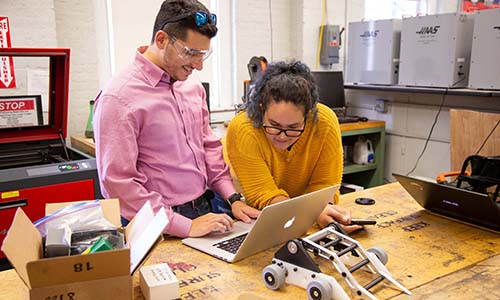Bachelor's Degree in Interactive Media & Game Development (BS)
WPI’s pioneering, top-ranked BS degree in Interactive Media & Game Development will both stretch and focus your talents as you explore the technical and artistic aspects of game development.
In our close-knit Interactive Media & Game Development bachelor’s degree program, faculty and students alike share a passion for finding new ways of looking at traditional media in order to create new media. Beginning on your first days on campus, you’ll be pushing boundaries and making things that matter to you, whether that’s games, interactive fiction, art installations, collaborative performances, or virtual environments.


The WPI Way
If you’re interested in a Interactive Media & Game Development (BS) degree at WPI, discover our award-winning faculty, cutting-edge research, and world-changing projects, along with the inspiring accomplishments of our alumni.
Curriculum
Our BS in game design and development provides an outstanding interdisciplinary education in the principles of interactive applications and computer-based game development. While each student chooses to focus on either the artistic or technical side of the field, all gain a broad understanding of both, developing a base of knowledge in computer science, mathematics, science, art, music, and English.
By completing rigorous courses and projects as part of your game development bachelor’s degree, you can explore a wide variety of topics in game development and interactive media, from game studies to digital painting, storytelling, audio arts, and social impact of games. Specific concentrations are available in visual art; design; audio and music; technical art; and writing.
BS/MS Option
Interactive Media & Game Development students admitted to the BS/MS program are able to count certain courses toward both undergraduate and graduate degrees, completing the program in approximately five years.
Project-based Learning
Hands-on, project-based learning is the cornerstone of the WPI experience, and a big reason why you’ll stand out to employers. As an Interactive Media and Game Development major, your options might include supporting faculty research, conducting projects off-campus in the U.S. or abroad, and finding your niche.
More Value
Whether it’s real-world work experience through a co-op or internship, accelerating your path with a BS/MS program, or even finding opportunities to integrate coursework with extracurricular interests, personalizing your education at WPI pays off. See how WPI changes your path.
Channel Your Creative Side with a Bachelor of Arts in Game Design & Development
Our Interactive Media and Game Development bachelor of arts focuses more on the creation of games, from animation and artistry to design and writing. If you have a passion for creating video games and shaping societal entertainment, this is the game design bachelor degree for you. Do you have a passion for gaming, but not sure you want to make it a full career focus? Our minor in interactive media and game development allows students to explore various game design and development techniques, theory, tools, and more as they gain a solid foundation.
Ready to Take Your Passion for Gaming to the Next Level?
Already have your bachelor degree in game development and design? Level up your career with our nationally ranked interactive media and game development master’s. Whether you have a software development background or want to work in production, an MS from WPI will set you up for success. Are you more interested in the creative side of gaming? Our master of fine arts (MFA) can prepare you to become an independent artist focused on professional design concepts. This three-year game design MFA is studio-based, providing students exposure to what it’s like in the industry.
Earn a Computational Media PhD
Already have your game design bachelor degree as well as a master’s, and looking to take what you’ve learned even further? WPI’s new PhD in computational media gives you the chance to do just that by giving you the tools, resources, and support you need to connect creativity and human expression with computational media.